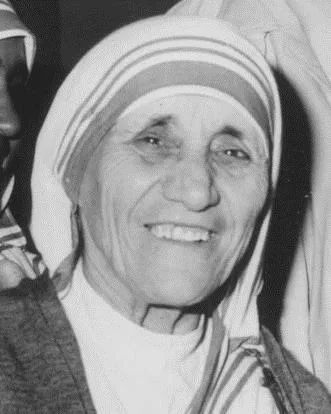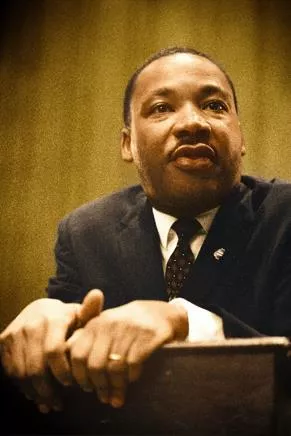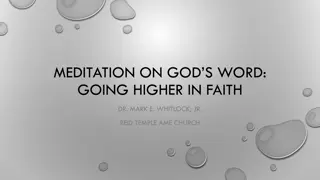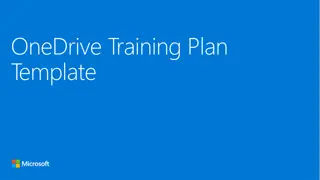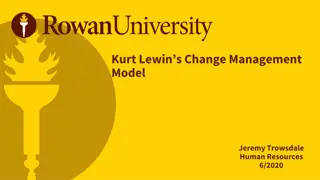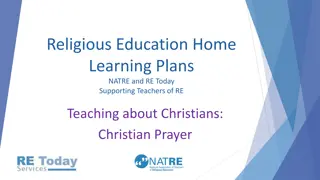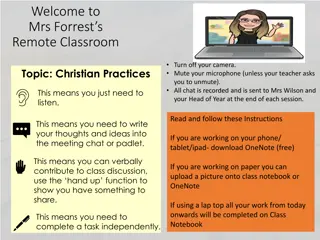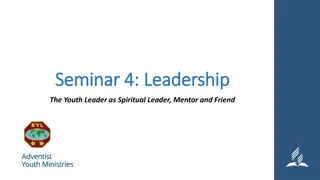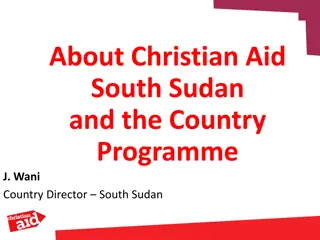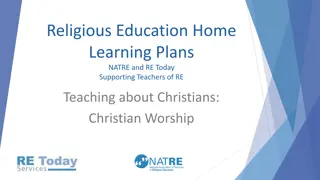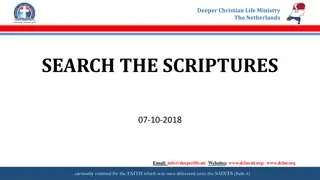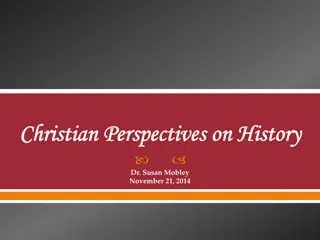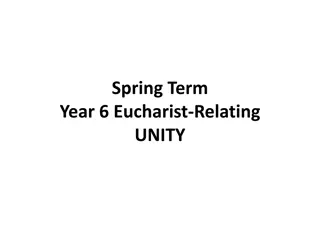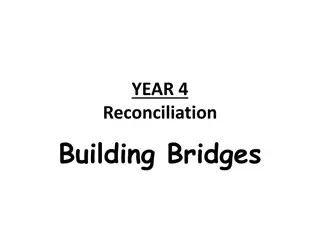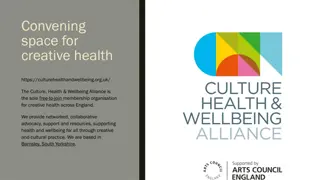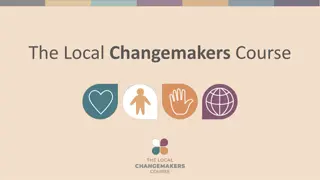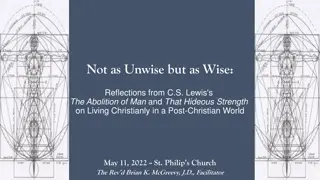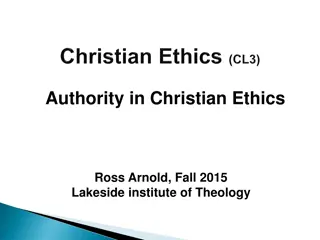Inspiring Change Through Christian Changemakers
Delve into the lives of influential Christian changemakers such as Mother Teresa and Martin Luther King Jr. Understand their impact on society, their methods of initiating change, and the role of faith in their transformative work. Explore different avenues of effecting change through engaging activities, discussions, and reflections.
Uploaded on Sep 18, 2024 | 1 Views
Download Presentation

Please find below an Image/Link to download the presentation.
The content on the website is provided AS IS for your information and personal use only. It may not be sold, licensed, or shared on other websites without obtaining consent from the author.If you encounter any issues during the download, it is possible that the publisher has removed the file from their server.
You are allowed to download the files provided on this website for personal or commercial use, subject to the condition that they are used lawfully. All files are the property of their respective owners.
The content on the website is provided AS IS for your information and personal use only. It may not be sold, licensed, or shared on other websites without obtaining consent from the author.
E N D
Presentation Transcript
How Change Happens Session 1: Introduction This session will include: Opening Activity: Make Change Bingo Read Together: James 1: 19-27 Case Studies: Christian Changemakers Discussion Prayer You will need: Handout 1 or Slide 2 of this powerpoint A bible or copy of James 1: 19-27
Make Change Bingo Make Change Bingo Someone who has changed their diet (vegetarian, vegan, Fairtrade etc.) Someone who has written to their MP Someone who has convinced a friend/ family in a political decision Someone who has taken part in a demonstration or march Someone who has helped someone register to vote Someone who is part of a committee Someone who has met a local councillor Someone who has volunteered in their community Someone who has read the news today Someone who has changed their commute from driving Someone who is a member of a political party Someone who has met their MP Someone who has been convinced by a political decision by a friend/ family Someone who has shared a petition on social media Someone who has taken part in a local consultation Someone who is proud of a change they made at work How does change really happen?
Mother Teresa (1910 Mother Teresa (1910- -1997) 1997) Mother Teresa was an Albanian-Indian Roman Catholic nun and missionary, born in what is now known as the Republic of Macedonia but spent most of her life in India. In 1950, she founded the Missionaries of Charity, a Roman Catholic religious congregation in Calcutta India, dedicated to helping the the poorest of the poor . At the time of her death, the Missionaries of Charity had over 4,000 sisters and an associated brotherhood of 300 members operating 610 missions in 123 countries. Her life-long devotion to the care of the poor, the sick, and the disadvantaged was one of the highest examples of service to humanity and her memory and life s work is revered all over the world still today. Take one person at a time and discuss: What change did this person influence? How did they do this? What role did their faith play in making change? How does change really happen?
Martin Luther King Jr (1929 Martin Luther King Jr (1929- -1968) 1968) King was a Baptist pastor in the USA who became a leader of the civil rights movement, seeking an end to racial segregation. On more than one occasion, he was arrested and imprisoned, and was also the subject of frequent death threats. Though a leader of acts of civil disobedience, such as a bus boycott, he was committed to nonviolence throughout his life. He was assassinated shortly after his famous speech, I have a dream . Take one person at a time and discuss: What change did this person influence? How did they do this? What role did their faith play in making change? How does change really happen?
Dietrich Bonhoeffer (1906 Dietrich Bonhoeffer (1906- -1945) 1945) Bonhoeffer grew up in Germany. As a pastor and theologian, he grappled with how, as a Christian, he should respond to the rise of Nazism. He reluctantly concluded that he could not ignore or support the actions of the ruling party. Following Christ meant being in active opposition to Nazi ideology. After much heart searching, he participated in a plot to kill Hitler, and was eventually imprisoned and executed. Take one person at a time and discuss: What change did this person influence? How did they do this? What role did their faith play in making change? How does change really happen?
Discussion Questions Discussion Questions Look at James 1:22-25 again. Where in the Bible do you see a call to engage in making political change? In verses 19-20,James challenges human anger . What role does anger play in change making? When can it be helpful and when can it be damaging? James writes of the importance of putting faith into action. How do we see this played out in the case studies above? How does this vary? What opportunities are there for Christian communities to influence political change in our society? What are the challenges? What change would you like to see happen? How does change really happen?
Prayer Prayer God of justice, Thank you that you are a God committed to your people and your world. Thank you for the legacy of your followers who have influenced change throughout history to create a fairer future. We repent of the times that we have been complacent in allowing injustice to go unchallenged. Thank you that you invite us to be a part of transforming our world together and we pray for your wisdom as we seek to do your work on earth. Amen. How does change really happen?
How Change Happens Session 2: Why is change so slow? This session will include: Opening Activity: The Church Budget Video: Why is change so slow? Case Studies: Pensions Discussion Prayer You will need: Handout 2 or Slide 2 of this powerpoint
The Church Budget The Church Budget Imagine you are the church council. Your church has unexpectedly been given a grant of 5000, and you have to decide what to spend it on. In an impulse buy, the minister has already committed to buying an ornate new pulpit for 500. You could cancel that purchase, but you would only get 250 back. Up-to-date hymn books 200 Coffee machine - 500 New music group equipment - 750 New welcome sign - 250 Replacing pews with chairs 4000 Re-paint church hall - 400 Smoke machine 100 Sound desk - 250 Employ a mission worker for 1 day a week - 3500 New projector/screens - 500 Brand new piano/organ - 2500 Bibles - 250 Week of outreach - 2000 Year s supply of high quality biscuits - 250 Microphones - 250 Donate to local food bank amount of your choice New carpets - 2000 Put it in the reserves amount of your choice How does change really happen?
Case Study: Pensions Case Study: Pensions Pre-existing structures often mean that certain welfare areas are resistant to reform. The Pension systems is one key example of this. Most countries operate pensions on a pay-as-you-go basis. This means that the pay contributions made by current workers are used to finance the previous generation retirement. If the system was to change, for example to switch to private funding arrangements, it would place a far greater burden on current workers as they would still be required to finance the previous generations retirement, while at the same time having to save up for their own. This would likely be very unpopular politically, meaning even if it was ideologically preferable, no government is likely to take that risk. Can you think of other examples of where policy reform has been held back because of the difficulty in challenging the status quo? How does change really happen?
Discussion Questions Discussion Questions Have you ever been frustrated with the pace of change in the past? If so, when? How do we resist getting fatigued when the change we want takes a long time? How might our faith help with this? How might understanding why change is slow help us when we want to bring about change? Read together: Acts 15: 1-21. What might this tell us about overcoming resistance to change? How does change really happen?
Prayer Prayer Unchanging God, While your steadfast love remains the same, the context we live in changes rapidly, and often requires us to change with it. When the status quo is failing, grant us perception. When change seems slow, grant us patience. When the system is frustrating, grant us perseverance. Help us to seek the change you want to see, now and always, Amen. How does change really happen?
How Change Happens Session 3: When does change happen? This session will include: Opening Activity: The Pitch Video: When does change happen? Case Studies: American civil nuclear power policy Discussion Prayer
The Pitch The Pitch You will need: A team of decision makers, and a team of presenters. The pitches: Pitch One: The Church should get chickens Pitch two: Every August the church services should be held outside. Pitch three: Doughnuts should be served with the tea and coffee after church. Pitch four: The church should host a monthly board games evening. Pitch five: This year s nativity play should be a musical. How does change really happen?
Case Study: American civil nuclear power policy Case Study: American civil nuclear power policy Initially when nuclear power was introduced after World War 2, there were minimal opposing voices. In fact, Nuclear power seen as representing technological progress. This was the dominant policy image until the 1970s, when National Unions and environmental activists began to challenge it, raising concerns that nuclear power was a danger to the environment. These concerns were then backed by many scientific experts, who questioned the safety of nuclear power. Their backing gave these claims greater credibility, since they could not simply be dismissed as disgruntled activists. The Unions and environmental activists saw this new scientific thinking as a window of opportunity to further their concerns. They disseminated this new message through popular media in order to change the public perception of the policy. Through these efforts, this new policy image gained the attention of congress, courts, local government and regulatory bodies, exerting pressure on them and resulting in regulatory change in nuclear power policy. Can you think of other examples of when the framing of an issue has led to policy change? How does change really happen?
Discussion Questions Discussion Questions Think about a few policy areas that are important to members of your group and discuss these questions: What might a window of opportunity look like for this policy area? What is the policy's overall image? How do the public perceive this policy area? How do politicians perceive this policy area? How does the media cover this policy area? What are the current dominant facts and values that are involved in shaping how this policy area is perceived? What are the facts and values that we want to shape the way this policy area is perceived? What might our faith have to say about this policy area? How can we frame this in a way that would appeal beyond the church without losing our distinctively Christian voice? How does change really happen?
Prayer Prayer Righteous God, We thank you that you are a God of justice and are stirring in us hearts for change-making. We pray for opportunities to speak up for justice and call for policy change. And as we speak up grant us your wisdom and guidance as we can speak with a distinctively Christian voice. Enable us to be your hands and feet in the political sphere, so that we can live in a world characterised by peace, justice and love. Amen How does change really happen?
How Change Happens Session 4: Where does change happen? This session will include: Opening Activity: Taboo Video: Where does change happen? Case Studies: Different Arenas of change Discussion Prayer You will need: A bible or a copy of Acts 17:16-21
Taboo Taboo Each person will be sent a message on the chat with a word, and a list of Taboo words. They must describe their word for the rest of the group together, but they must not use any of the words included in the Taboo list to describe the word. How does change really happen?
Case Study 1: Case Study 1: Devolved: Fracking Ban in Scotland Devolved: Fracking Ban in Scotland Friends of the Earth and other environmental groups spent six years campaigning for fracking to be banned in Scotland. A combination of mass protests, engaging with the public on the streets and working collaboratively with MSPs, kept the issue present in Holyrood and educated policymakers over time to their concerns. By facing both policymakers and the public, popular support for this policy change spread. As opposition parties began to adopt this position, the 2016 Holyrood election saw pressure on the First Minister to also support the anti-fracking cause. It was in this context that MSP, Claudia Beamish introduced a Private Members Bill to ban fracking and a public consultation was launched gathering responses from over 60,000 sources. The bill was passed and in 2017 banning fracking in Scotland. How does change really happen?
Case Study 2: Case Study 2: National: The Climate Coalition National: The Climate Coalition In 2019 there was a huge surge in attention on the climate crisis in the UK. Activist groups such as Extinction Rebellion and Youth Strike for the Climate, who had been campaigning for years and had the goal of making people and governments take heed of the global climate crisis and commit to taking significant action. After Extinction Rebellion occupied the streets of London in 2019 and over 1000 arrests were made for civil disobedience, the UK Parliament declared a climate emergency. They also became one of the first countries around the world to legislate to reach net-zero greenhouse gas emissions by 2050. Whilst this is not the campaign ask that Extinction Rebellion campaigned for (net- zero by 2025) these actions significantly raised the profile of climate issues across the UK and in Parliament. How does change really happen?
Case Study 2: Case Study 2: International: Christian Aid and the World Bank International: Christian Aid and the World Bank Christian Aid, alongside other partners have campaigned for years to get the World Bank to stop funding fossil fuel infrastructure projects around the world. To do this they had to tackle the popular view that fossil fuels were the only option for developing nations. In 2012, the campaign saw a success with the World Bank committing to stopping funding coal power stations. This campaign has continued since to challenge the World Bank to make this transition for all fossil fuels and to see renewable energy sources used to provide a cleaner future. How does change really happen?
Discussion Questions Discussion Questions What similarities do you see across these campaigns and across the different political arenas discussed in the video? What differences are there between these arenas? How would you approach them differently? Read Acts 17:16-21. We see Paul engaging in the market place as well as the Areopagus, the council in the city of Athens. How do these locations interact? How does Paul move between them and how does he act in each of them? A key observation in the case studies is that campaigners often spend years collaborating with stakeholders. How can this be sustained? How could you start to build relationships with key individuals in these arenas? Think of a change that you want to see happen, which arenas would you need to be engaging with as you work towards influencing change? How does change really happen?
Prayer Prayer Ever-present God, Thank you that as we approach new and unfamiliar arenas you are there with us. We pray for our leaders, in local authorities, devolved administrations, in Parliament and around the world. We pray that your peace will be found in these spaces and communities. Help us to engage with policy-makers with grace, with integrity and with wisdom. Amen How does change really happen?
How Change Happens Session 5: Who makes change? This session will include: Opening Activity: Who is involved in my decisions? Video: Who makes change? Case Studies: Upskirting Discussion Prayer You will need: A copy of Handout four or Slide two of this session
Who is involved in my decisions? Who is involved in my decisions? Think of a really important decision that you ve made in your life, and try to list all the people or groups who influenced that decision directly or indirectly, in a large or small way. Tim s Big Decision A really important decision for Tim was deciding where to go for University. He recognises that although ultimately he made the final decision, a large number of people influenced that decision. His parents gave him lots of advice based on their previous experience, his teachers talked to him about his expected grades and therefore what courses he might be accepted onto, one of his friends had said she didn t like a particular city so he didn t consider looking there. Then he considered the bigger picture of who had influenced his decision. Tim liked the idea of living at home during university, so the local councillor who had pushed for improved public transport links between his village and the nearby University town impacted his decision. As, in a small way, did the graphic designer of the very nicely-looking booklet he received from the university he eventually chose. Not to mention the kind man at his work experience placement who encouraged him to pursue his subject area. Tim was surprised by how many people he could name, and realised that when Universities are trying to influence students decision- making, it requires more than talking to them directly. How does change really happen?
Case Study: Case Study: Upskirting Upskirting In 2017, while at a festival, Gina Martin was a victim of upskirting this is where someone points a camera up a non- consenting individual s clothing and takes intrusive photos. Furious, she told the police, at which point she found out there was little they could do because under the law upskirting did not count as a sexual offence. Committed to changing this, Martin launched a social media campaign and a petition which received over 100,000 signatures. Over the course of 2 years, she worked with lawyers, spoke with politicians, made media appearances, listened to others who had similar experiences, and in April 2019 the Voyeurism (Offences) Act was passed into law to make the practice illegal. Martin was an ordinary woman who changed the law through determination and getting the right people on board. What do you think of Gina Martin s story? What different groups were involved in helping Gina s campaign to make upskirting illegal? How does change really happen?
Discussion Questions Discussion Questions Are there any groups or people you think the video missed out? Which groups do you think tend to have the most influence in policymaking? Who do you think should have more influence than they currently do? Have you engaged with any of these groups before? Pick three of the groups or people that have been mentioned, discuss how the Church might engage with them. How does change really happen?
Prayer Prayer Loving God, We give thanks for those who offer themselves in positions of political authority and responsibility. May they use that authority wisely and justly, seeking to include the right people in their decision-making. We also thank you for the work of those who help influence change, for those who amplify the voices of the marginalised, research the effects of policies, who see something is wrong and seek to change it. We pray that we ourselves may be change makers. Even when the influence we have may seem small, help us use that influence effectively, and not become weary in doing good, knowing at the proper time we will reap a harvest if we do not give up. Amen. How does change really happen?
How Change Happens Session 6: What can I do to make change? This session will include: Opening Activity: How can the Church affect change? Video: What can I do to make change? Case Studies: Period poverty in Scotland Discussion Prayer
How can the church effect change? How can the church effect change? Use the Whiteboard on Zoom to write down one important think you think the Church would need to do to affect political change. Example: Researching where politicians stand on a key issue. Use the Stickers on the whiteboard to mark the three suggestions you think are the most important. Discuss the areas which were most popular. Why do you think these are the most important? How does change really happen?
Case Study: Case Study: Period Poverty in Scotland Period Poverty in Scotland Girlguiding Scotland s advocacy in this area is a heartening example of ordinary people campaigning around an issue they are passionate about and making a real difference. Period stigma and inability to buy sanitary products were issues known to many Girl Guides, and after looking at the statistics and hearing stories from food banks, the charity as a whole decided to launch their own campaign around the issue. This, and calls by other groups on the issue, were picked up by Labour MSP Monica Lennon, who brought forward a bill in the Scottish Parliament which would create a legal duty on the Scottish government to ensure that period products are available free of charge "for anyone who needs them." The Scottish government initially refused to support the bill, but rather than giving up, Girlguiding Scotland continued to urge the government to reconsider. Public pressure eventually forced a U-turn, and the Period Products (Free Provision) (Scotland) Bill passed its first stage in February 2020. Might this be cause for optimism for the Church making change? What might the challenges be? How does change really happen?
Discussion Questions Discussion Questions Was there anything in the video that jumped out for you? Have you had any experience with affecting political change? What are the things that hold us back from trying to bring about change? We are encouraging churches to build relationships with their MPs. What do you think is the role of relationship building in change making? How might the Church be particularly well placed, or otherwise, to influence change? How does change really happen?
Prayer Prayer God of the possible, Open our eyes to what we can achieve, not in our own strength but yours. Convict us to care for the issues you care about, knowing no inch of public life is outside of your domain. Inspire us with your Holy Spirit to think creatively, passionately, and practically about what we can do to further your Kingdom on Earth. May your will be done through us, In Jesus name, Amen How does change really happen?
So what happens next? So what happens next? Reflect on the sessions you have participated in during this study. What have you learnt? What has inspired you? Think of one word to answer the question: What Happens Next? How does change really happen?









